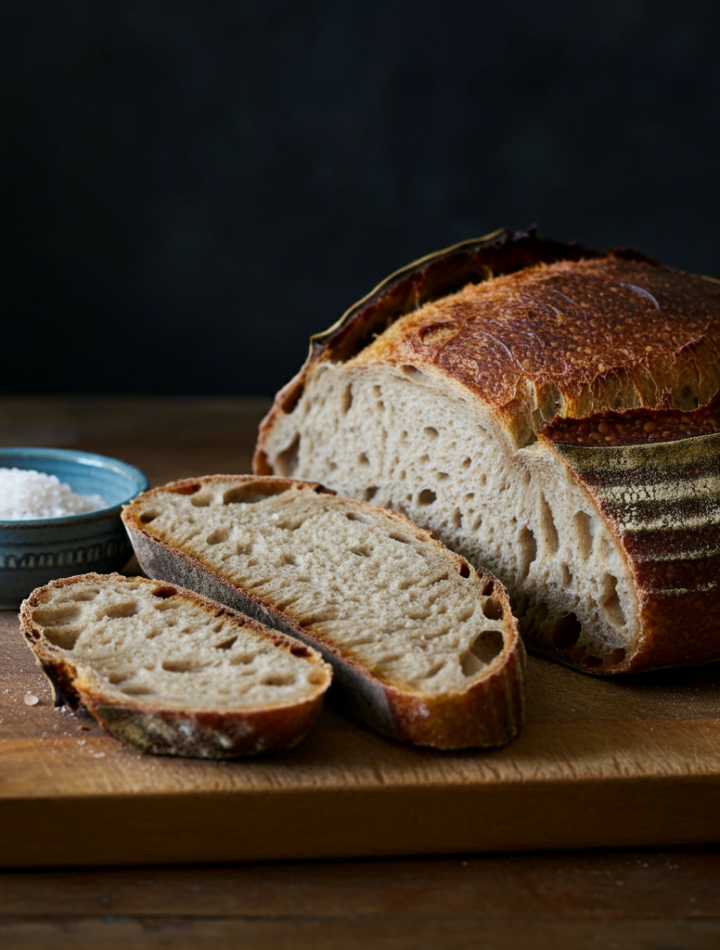Could I Add Celtic Salt to My Sourdough Bread Recipe?
If you’re a sourdough enthusiast, you’ve likely spent countless hours perfecting your bread recipe, tweaking it to get just the right crust, crumb, and flavor. One question that often arises for those looking to elevate their baking is: Could I add Celtic salt to my sourdough bread recipe? The short answer is a resounding yes! But let’s dive deeper into why you should consider this option and how it can transform your bread into a more nutritious and flavorful loaf.
Understanding Celtic Salt: What Is It?
Celtic salt, often referred to as sea salt or gray salt, is harvested from the coastal regions of France. Unlike regular table salt, Celtic salt is unrefined and naturally dried, retaining its rich mineral content. This salt is known for its grayish hue, which comes from the clay and mineral-rich tidal ponds where it is harvested.
Celtic salt is revered not just for its flavor but also for its health benefits. It’s packed with essential minerals like magnesium, potassium, and calcium, which are often stripped from other types of salt during processing. These minerals contribute not only to the nutritional value of the salt but also to its distinct, briny flavor, making it a sought-after ingredient in culinary circles.
Why Add Salt to Sourdough Bread?
Salt plays a crucial role in bread making, particularly in sourdough. Here’s why:
- Flavor Enhancement: Salt brings out the natural flavors in the dough, balancing the tanginess of the sourdough.
- Texture Improvement: It strengthens the gluten network, resulting in a better crumb structure and a more elastic dough.
- Fermentation Control: Salt slows down yeast fermentation, giving the dough enough time to develop its characteristic flavor without over-proofing.
Given these benefits, the type of salt you choose can significantly impact your sourdough bread.
Celtic Salt vs. Regular Salt: What’s the Difference?
When it comes to choosing between Celtic salt and regular table salt, the differences are substantial:
- Mineral Content: Celtic salt contains a wide range of trace minerals that are beneficial to health, while table salt is typically stripped of these during processing.
- Taste: Celtic salt has a more complex, earthy flavor compared to the sharpness of table salt.
- Texture: Celtic salt is coarser, which can influence how it disperses throughout the dough.
By using Celtic salt in your sourdough, you’re not just seasoning your bread; you’re enriching it with nutrients and enhancing its overall taste profile.
How Does Celtic Salt Affect Sourdough Fermentation?
One of the key considerations when adding any salt to sourdough is how it will affect fermentation. Celtic salt, with its mineral content, can influence the fermentation process differently than refined salt. The minerals in Celtic salt can interact with the yeast and bacteria in the sourdough starter, potentially leading to a slightly slower fermentation process. This isn’t a drawback, however; a slower fermentation often results in more complex flavors.
How to Incorporate Celtic Salt into Your Sourdough Bread Recipe
Incorporating Celtic salt into your sourdough recipe is straightforward, but there are a few tips to ensure the best results:
- Measure by Weight: Given its coarse nature, it’s best to measure Celtic salt by weight rather than volume to ensure consistency.
- Dissolve in Water: To help the salt distribute evenly throughout the dough, consider dissolving it in your mixing water.
- Adjust Fermentation Time: Since Celtic salt can slow down fermentation, keep an eye on your dough and be prepared to extend proofing times if necessary.
Benefits of Using Celtic Salt in Sourdough Bread
There are numerous benefits to using Celtic salt in your sourdough bread:
- Enhanced Flavor: The complex, briny taste of Celtic salt adds depth to the flavor of your bread, complementing the tang of the sourdough.
- Nutritional Boost: The minerals in Celtic salt contribute to the nutritional profile of your bread, providing essential nutrients like magnesium and potassium.
- Better Texture: The moisture content and coarse nature of Celtic salt can contribute to a better crumb structure and crust development.
Is Celtic Salt Healthier Than Regular Salt?
Celtic salt is often touted as a healthier alternative to regular table salt due to its mineral content and lack of additives. While it’s still salt and should be used in moderation, the minerals in Celtic salt can provide health benefits that you wouldn’t get from regular salt. These minerals can support everything from bone health to electrolyte balance, making Celtic salt a more nutritious choice for your baking needs.
What Are the Drawbacks of Using Celtic Salt?
While Celtic salt has many benefits, there are a few considerations to keep in mind:
- Cost: Celtic salt is generally more expensive than regular salt, which might be a factor if you’re baking in large quantities.
- Availability: It can be harder to find, especially in areas where specialty ingredients are less accessible.
- Moisture Content: The higher moisture content in Celtic salt can slightly affect your dough’s hydration, so adjustments might be needed.
Adjusting Your Recipe: How Much Celtic Salt to Use?
When substituting Celtic salt for regular salt in your sourdough recipe, you might need to adjust the quantity due to its coarser texture and moisture content. A general rule of thumb is to start with the same weight of Celtic salt as your recipe calls for in regular salt and then adjust to taste.
Does Celtic Salt Change the Flavor of Sourdough Bread?
Absolutely! The minerals in Celtic salt contribute to a more nuanced, layered flavor in your sourdough bread. Instead of just adding saltiness, Celtic salt enhances the natural flavors of the flour and the tang from the sourdough fermentation, creating a more complex and satisfying taste.
Tips for Perfecting Your Sourdough with Celtic Salt
To get the most out of using Celtic salt in your sourdough bread, consider these tips:
- Experiment with Ratios: Start with a small batch and experiment with the amount of Celtic salt to find the perfect balance for your taste.
- Pair with Whole Grains: Celtic salt pairs particularly well with whole grain flours, which also have a rich, earthy flavor.
- Monitor Dough Hydration: Because Celtic salt has a higher moisture content, you may need to slightly reduce the water in your dough to achieve the desired consistency.
Is Celtic Salt Suitable for All Types of Sourdough Bread?
Celtic salt can be used in a variety of sourdough bread types, from basic white sourdough to more complex multigrain loaves. Its versatility makes it a great addition to any bread recipe, allowing you to explore different flavor profiles and textures.
Storing Celtic Salt for Sourdough Baking
Proper storage of Celtic salt is key to maintaining its quality:
- Keep It Dry: Store Celtic salt in an airtight container in a cool, dry place to prevent it from absorbing too much moisture from the air.
- Avoid Metal Containers: Use glass or ceramic containers to avoid any potential reactions between the salt and metal.
Common Mistakes When Using Celtic Salt in Sourdough Bread
Here are some common pitfalls to avoid when using Celtic salt:
- Over-Salting: Because Celtic salt has a more robust flavor, it’s easy to over-salt your bread. Start with less and adjust as needed.
- Uneven Distribution: If the salt isn’t properly dissolved or mixed into the dough, you might end up with unevenly flavored bread. Dissolving the salt in water can help prevent this.
The Science Behind Salt and Sourdough
The interaction between salt and sourdough is a fascinating aspect of baking science. Salt controls yeast activity and strengthens gluten, two critical factors in achieving a well-structured, flavorful loaf. The specific minerals in Celtic salt can further enhance these effects, leading to a unique and improved bread-making experience.
Can You Use Celtic Salt in Other Baked Goods?
Yes! Celtic salt’s unique flavor and nutritional benefits make it a great choice for a variety of baked goods, from rustic loaves to sweet pastries. Its coarse texture can also add a pleasing crunch when sprinkled on top of cookies or biscuits before baking.
How Does Celtic Salt Compare to Other Specialty Salts?
There are many types of specialty salts available, such as Himalayan pink salt, Maldon sea salt, and fleur de sel. Each has its own distinct characteristics:
- Himalayan Pink Salt: Milder flavor, rich in iron, and less moisture than Celtic salt.
- Maldon Sea Salt: Flaky texture, delicate flavor, and often used as a finishing salt.
- Fleur de Sel: Known for its fine crystals and mild, sweet flavor, often used as a finishing salt as well.
Celtic salt, with its robust flavor and high mineral content, offers a unique combination of taste and health benefits, making it an excellent choice for sourdough bread.
How to Source Quality Celtic Salt for Baking
When purchasing Celtic salt, look for:
- Authenticity: Ensure it’s labeled as “Celtic sea salt” and comes from a reputable supplier.
- Coarse Grind: Opt for a coarse grind for baking, which you can always grind finer if needed.
- Organic Certification: Some Celtic salts are organically certified, ensuring no chemicals or additives.
FAQs
Could using Celtic salt in sourdough bread affect the bread’s shelf life?
Yes, Celtic salt’s mineral content can slightly extend the bread’s shelf life by inhibiting microbial growth, though the effect is minimal.
Is Celtic salt better for those on a low-sodium diet?
Celtic salt contains the same amount of sodium as other salts, so it should still be used in moderation.
Can I use Celtic salt in sweet sourdough recipes?
Absolutely! The complex flavor of Celtic salt can complement the sweetness in sourdough-based pastries and desserts.
Does the moisture content in Celtic salt require me to adjust the hydration of my dough?
Yes, you might need to slightly reduce the water in your recipe to account for the moisture in Celtic salt.
Can I substitute Celtic salt for kosher salt in my sourdough recipe?
Yes, but remember to adjust the quantity as Celtic salt is more concentrated in flavor due to its mineral content.
Will Celtic salt change the color of my sourdough bread?
Celtic salt may impart a very slight grayish hue to the bread, but this is generally not noticeable after baking.
Conclusion
Adding Celtic salt to your sourdough bread recipe is more than just a simple swap; it’s a way to elevate your bread both in flavor and nutrition. The mineral-rich profile of Celtic salt not only enhances the taste of your bread but also contributes to its overall health benefits. Whether you’re a seasoned baker or just starting, experimenting with Celtic salt in your sourdough can open up new dimensions in your bread-making journey. So, next time you’re mixing up a batch of dough, consider reaching for Celtic salt to see how it transforms your sourdough into something truly special.






